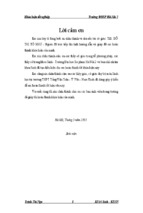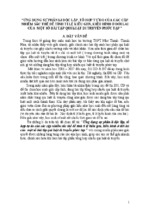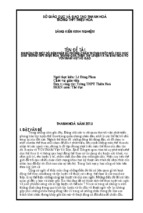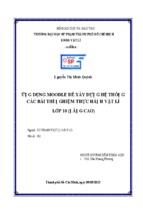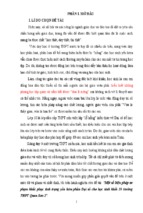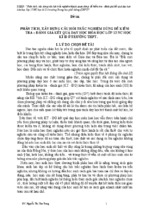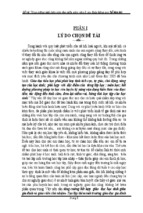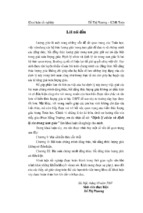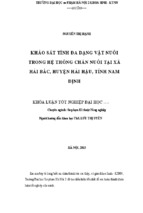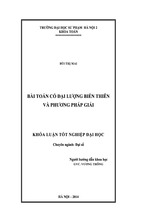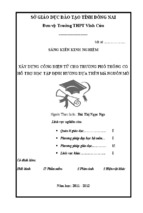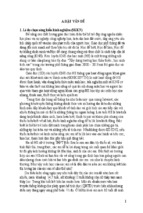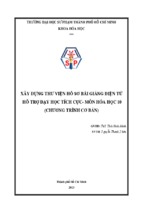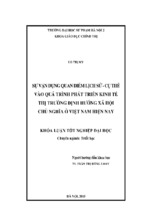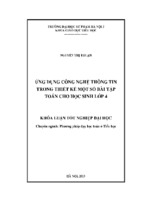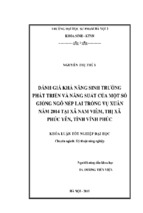THE DEPARTMENT OF EDUCATION AND TRAINING IN
THANH HOÁ
THƯỜNG XUÂN 2 HIGH SCHOOL
THE INITIATIVE FROM TEACHING EXPERIENCE:
SOME EFFECTIVE WAYS TO ATTRACT
STUDENTS’ INTEREST IN LEARNING ENGLISH
AT THƯỜNG XUÂN 2 HIGH SCHOOL
Teacher’s full name: Vũ Thị Hồng
Position
: Teacher
The initiative of
: Teaching English
1
JULY 2020
I. INTRODUCTION
1. Reason for choosing the topic:
The difference of language prevents us from exchanging economy,
politics and culture among nations in the World. Trade libralization and
globalization of the World’s economy have been the special trend of the current
society. Foreign language is one of the necessary materials which helps each of
us go into the World with confidence.
The typical expression of the general trend of globalization is the
association of economy among nations in the region and in all the World. This
has a great influence on the international relationship and the life in each
country. It is not only the economic cooperation but also the cultural integration
among nations, so the knowlegde of foreign language is becoming the general
trend in the World. The founding of ASEAN economic community in 2015
allows the free labours to move abroad. This makes a chance for the experts or
the professional workers in ASEAN’s countries to join the trading activities and
invest abroad. This action has been satisfying the lack of the worker force
within countries in the region; and improving the workers’ payment and
experience. Of course, many of those workers are Vietnamese. It means that
foreign language is considered as “an important ticket” to come into other
countries in the region and in the World for work. Thus, foreign language is
necessary and evident for people who want to work with foreigners in both
home and aboard.
From seeing the benefit of English, our Government leads this subject
into the curriculum in schools, beginning from primary schools. Schools have
been invested much money in improving materials which are used for teaching
and learning English. So our Thuong Xuan 2 high school does. But, in fact, the
Vietnamese’s ability of foreign language is not good. As the declaration of the
index of the Global English expertness - EFEPI - in 2015 from International
Educating Organization, Vietnam’s expertness is at the average of index, it’s
about 53,81% , with that result, Vietnam ranks 29 out of 70 countries. Now we
can see that foreign language as “a key” to help every one, every country
improve the future. It has been believed that learning foreign languages express
the trending of integration clearly for an individual, a country.
So, imroving the efficiency of teaching and learning English in schools in
general is necessary. Especially, in mountainous areas like Thuong Xuan
province. According to me, the teachers of English should inspire the passion of
learning for this subject for each learner. The teacher of foreign language’s
mission does not only teach the knowlegde of language but also creats
2
inspiration in learning for each student. Teachers should help students
comprehend: Speaking some foreign language well is an efficient instrument to
approach the modern science and technology, to enrich for themselves and for
their country. It’s considered as an important way for success. I think that the
young people do enthusiasticaly things that they love. So, if we make them love
English, they will try their best to achieve it in many their ways. Teaching and
learning must be easier from that.
From the above given reasons, I decide to choose the theme “ some
effective ways to attract students’ interest in learning English at Thuong
Xuan 2 high school” for my research.
2. Aim of the research:
The aims of the research are to find the way to promote students’ interest
in learning English.
3. The subject of study:
In this study, I concentrate on researching on my students’ attitude and
interest in learning English. Then, I conclude the reason why my students are
not interested in learning English much. At last, I try to find the best way to
motivate my students to learn English. The subject of this study is the students
in class 11B1 at Thuong Xuan 2 High school. The number of students consists
of 35.
4. Research methodology:
- Observing.
- Sharing.
- Listening.
- Analysis.
3
II. CONTENT
1. Theoretical Background:
In a recent blog post at the NCWIT blog, the researchers give some
reasons for the problem why it is very important for students to have teachers
who know the way how to inspire the students’ interest in learning. They get
students interested and even excited about what they are learning. Passion is
what makes students decide to study more.
A research shows that a teacher for a while who taught both math (which
he loved) and computer science (which he was not so enthusiastic about). The
difference in the level of success between students in those different courses was
amazing. Same teacher. Same brilliant mind. But a different level of enthusiasm
meant different levels of results.
Good teachers will find a way to get more interested in what they are
teaching and to make things more interesting for their students. It requires a little
more work, a little more imagination, and maybe even a little acting ability. The
best teachers make learning interesting, exciting and important. The teachers
who do that well deserve the students and their parents.
Nowadays, English is admitted to be an International language. It is
spoken widely in the World. More and more foreign cooperations and
companies have invested in Viet Nam since viet nam joined ASEAN. So,
employees have to use English in work and in communication well beside they
are high professional employees. Thus, people who communicate in English
well can get a good job in some foreign company with the high payment, and
they have also a chance to develop further in their job’s position and their work.
The current serious fact is that using materials of teaching English in high
schools in Viet Nam hasn’t brought the desired effect back yet. This makes
many students and their parents not to be pleasant. Most of students who learn
English in 7 years at schools are not able to listen, speak, read and write in
English. The lastest searches show the pessimistic result: Many pupils who
finished their compulsory education at lower schools are only able to speak and
listen to the simple sentences about name or year-old, they can’t speak in
English in daily communication. From this, many students are sent to the
famous foreign language centers to approach the more modern conditions of
teaching and learning English.
2. The reality of learning English before applying this initiative:
4
English teaching is not a piece of easy work. Especially, many students
are losing their interest and showing negative attitude towards english learning.
Teachers are always complaining that it’s hard to improve students’ scores and
the students are too lazy to learn the words, recite the dialogues and finish
exercises. To some degree, the effective way to make the English teaching and
learning go smoothly is to improve students’ interest in learning English,
Einstein once said: “interest is the best teacher”. Interest is a kind of direct
motivation to push students’ study. That means interest plays an important part
in learning English. as to the teacher, it is worth-while to improve students’
interest. It can make students concentrate on what they are learning and think
actively. Learning English is quite different from other subjects’ learning. It is a
foreign language and there is not a good invironment for them to learn.
Relatively speaking, learning English is rather dull. Especially, learning so many
new words by heart is a hard nut to crack. As a result, a lot of students are afraid
of it. So, it’s teachers’ duty to motivate them to learn actively. Teachers should
spare no efforts to arouse their students’ interest.
I have been teaching English at Thuong Xuan 2 high school for many
years. This school is in a mountainous area so I know clearly what my students’
purpose is. So far, I have been able to confirm one thing: Most of my students
learn English for the GCSE, only a few study for the University entrance
examination.
Generally, the quality of students’ input is not high so it is very difficult
for both teachers and students in teaching and acquiring English. In fact, we
don’t only teach the very basic knowledge in the textbook but we have to teach
students all the knowledge that they learned before also.
Besides, there are also many reasons which make teaching and
learning English are prevented development, for example: Students don’t
have further materials, students don’t have time to study at home (their families
are very poor so they usually help their parents to get more money), they don’t
have chance to practice English much, … Because the living conditions of most
local people are still poor and backward so learning in general has not been
focused, particularly, learning English is attended hardly. Students have no any
reference and means of learning except their textbooks.
There are about 40 students in each class in my school. I think it is a large
class. So, it is very difficult for me to control my class while speaking and
students have no more chances to practice English skills, too. Especially in oral
skill because they have few words. My students cannot communicate in English,
even though they spent 6-7 years learning English at grammar schools. Actually,
in English curricula, there are lessons that use tapes and CDs to practise
listening and speaking skills, but my school resources and the habits of
individual teachers mean they are rarely used, especially in rural areas. Students
5
mostly copy the way their teachers speak, but many teachers mispronounce the
words themselves.
In the past, the teachers of English in my school used to teach English in
traditional teaching method which students stayed passive in learning and did
not have a communication environment and we didn’t care almost ways to
attract students’ attention. I think it is the main reason behind the ineffective
teaching and learning of English in our school because this makes our students
become afraid of speaking English.
We focused on teaching grammar much, and our students also focused on
grammar lessons in order to pass tests and examinations. This traditional way of
teaching I think we put our students in the "passive voice" when learning
English, and they cannot have good communication skills, even though students
can be good at grammar. I think that our students had to try to approach English
in the hard way and they seemed to be tired of this subject. I felt their tiredness
though their actions of learning this subject.
Since many recent years, I have been trying to perfect the questions: What
should teachers do to make students love learning English more ? and How do
the teachers do to make English more attractive and easier? At last, I can find
the answers for my questions ( I will show that in the next part ).
The other problem is that they learn English just to pass regular tests or
examinations, while they cannot use English in reality. Especially, many
students got high scores from exams and tests, but they can only write
grammatical sentences, while they are very bad at listening and communicating.
Many students tell me that they like learning English, and some of them always
have good learning results at school. However, when they meet foreigners or go
to an English club, they find out that they are afraid of speaking English in
crowded places because they was afraid of making mistakes.
Beside that, there is no place of tourism or some factory which foreigners
work or live in here so my students have no chance for communication. That's
why their listening and speaking skills are poor and my students become
frustrated by this.
I think that bad English skills have become a hot topic on education
forums. Educators have pointed out that it is the nature of Vietnamese people
that they can easily get embarrassed when making mistakes, therefore, they
would rather not to speak English to make mistakes. My students do, too.
3. The initiative is being applied to teach English in my school.
A great number of students in my school shared me that they learnt
English because they were required to learn this subject in their curriculum at
6
school. Similarly, not many said that they learnt English due to their love for this
foreign language. Obviously, no teachers can persuade their students to learn
English like a favourite subject if they dislike it. Hence, to help students learn
English better, it is important to make English become something special that
impresses students. I think that teachers of English should make students realise
that learning a new language gets so many benefit to them. They gain practical
knowlegde, learn valuable things about foreign cultures, and discover a whole
new World outside of their own.
These are some ways I have used to improve the learning English
problem in our school:
3.1. Forging the relationship between teacher and students.
Creating the close relationship in and outside the class between teachers
and students is necessary. This makes students feel easier and more friendly
when they make questions of lesson as well as share personal secrets with their
teachers. Students feel teachers like theirs friends. Forging the relationship with
students encourage them in conversations, too. For example, if your lesson is on
while your students can not focus on it because of something, you should let
them share their problem and you can participate in that action as a member.
Your taking part in the action to help students solve their problem will stop
wasting time for personal problem soon and will make the relationship between
teachers and students more close-knit. Students will have an interest in learning
English more from the reason they love you.
3.2. Explain the benefits.
As a teacher, you should be wise enough to explain subtly the benefits of
learning English to your students. Try to elaborate how mastering foreign
language is rewarding and beneficial. You can also add that learning English
correlates with better their academic results. This applies to career and selfdevelopment as well.
3.3. Make them use English (create a learning English environment).
Theoretical knowledge is the basic precondition for language learning but
it is even more important for your students to practice what they learn.
Therefore, as a teacher, you should create possibilities for them to use English
more. You may create a friendly learning English environment in each lesson.
Sometimes, you can organize debates or close meetings, where many students
will communicate in English as well as they will understand what they do or
don’t know.
Of course, mistakes come as a natural part of this process so you have to
provide support and encourage your students not to give up on expressing their
7
opinions in foreign language because the more they speak, the more they are
going to learn.
3.4. Make class fun.
Making class fun is a surefre way to up intrinsic motivation
levels. When students are having a good time, they’ll be more
engaged in learning. Their motivation will come from them
rather than from you. You just have to fnd the best ways to
help your students have a good time while they learn.
One thing I have remembered since I was a student is my teachers’
humour. They knew how to make the lesson easier and more interesting. I am
sure we used to be under study pressure, but our teachers helped us get over that
pressure by their funny teaching. Why don’t you make your class funny from
now? For example, if you are having a lecture of sports, you should change your
class into My Dinh stadium and your students will be athletes. I am sure that the
lecture will be more attractive; your students will comprehend and memorize the
lesson easier. They will be attracted from the begining to the end by you.
3.5. Let them know the timely results of learning.
Let your students see the results of their learning every once in a while,
it’s up to you to choose how. There are many ways to do it but keep in mind that
your students are young, so they are usually impatient and yearn for some
encouragement from your side.
It may be done by organizing an English speaking club with discussions
on the specific topic that they have already perfected. Introduce the rule with
scores and objectives so that students can enjoy achieving results through
correct use of foreign language. Any method that makes students feel proud
about the progress they made is valid.
These are two of teaching plans that I use the above ways to attract
my students in learning English, make them interested in learning English:
* The 1st teaching plan:
Unit 10: Nature in Danger (English 11 - skill: Speaking)
The main ways I focuss on in this lesson are: 3.3. Make them use English
(create a learning English environment) and 3.4. Make class fun.
Let’s begin:
8
In this lesson, I try my best to finish tasks in 20 minutes - to reach this
purpose I say my students as soon as the lesson starts that: “We will have a very
attractive action if we finish our lesson soon, in 20 minutes”. After finishing the
lesson, I write in block capitals on the board: “ROLE PLAY”, then I stop in 1
minutes to attract my students’ attraction. Of course, my students are going to
guess the name of the play while I am at secret. At last, I write the full sentence
on the board:
ROLE PLAY: A discussion between different parties interested in global
warming.
I divide the class into 4 groups with the names: Role A - Penguin leader,
Role B – Dessert dweller, Role C – Worried Martian, Role D – U.S. President.
Team up with classmates who have been assigned the same role to develop your
roles and discuss ideas and “strategies” before the role play begins. Introduce
yourself to the other role players. Discuss your roles after the role play ends.
Role A – Penguin leader
You live in Antarctica. You need global warming to stop. Temperatures must
actually get cooler. Your species is at great risk of extinction. Your habitat, the
ice, is melting and your sources of food are disappearing. The world must act to
save you. The day the last penguin dies is the start of the end of the Earth.
Role B – Dessert dweller
You like the recent effects of global warming. It has brought a lot of unexpected
rain to your land. For the first time you can grow things. You have bumper
harvests. You have lots of water to drink. You think global warming is simply a
matter or winners and losers. You think global warming or cooling has always
happened.
Role C – Worried Martian
Billions of years ago, Mars, your planet, looked like Earth. Life was everywhere.
However, greedy Martians controlled the energy sources and the Mars climate
changed, killing all life – except you. The greedy Martians paid leaders to
pretend nothing was happening and that alternative energies would arise. It was
all too late. Advise the Earthlings and the penguins of the dangers of climate
change.
9
Role D – U.S. President
You are terrified of taking measures to control global warming because you
might lose your power. You believe scientists can build a huge machine to refreeze the ice caps. You think keeping American jobs is more important than
penguin food. You know better than the world’s climate experts. You don’t
believe in aliens.
Students work in groups in 10 minutes. Then, the representative of each
group will show at the board. Teacher and other students give comments.
* The 2nd teaching plan:
Unit 16: THE WONDERS OF THE WORLD
(English 11 - SKILL: Reading)
The main ways I focuss on in this lesson are: 3.2. Explain the benefits
(Namely, learning English for travelling) and 3.4. Make class fun.
Warm up: (5 minutes)
(Teacher makes a short conversation with students by some simple sentences)
Teacher (T): Do you want to travel around the World?
Students (Sts): Yes, we do.
T: If you want to travel around the World, you have to know English. In this
lesson, we will come to a famous part of the World. It’s Egypt.
T: Who can tell me what Egypt is famous for? (you can show in Vietnamese)
Sts: (Pyramids/ Kim tự tháp).
T: Yea..h. I agree with you. Now, who can tell me the words related to the
Pyramids. (you can show your knowledge in both English or Vietnamese)
Sts: ( show their ideas)
10
T coppies the Sts’ answers on the board (the words are in Reading). Then, T
supplies the missing meanings and the new words.
I. Vocabulary: (15 mins)
* I combine the words which Sts showed in “Warm-up” and the pictures
on the projector to teach “Vocabulary”. Namely:
Teacher presents the first picture and says “This is the King in Egypt”
Students (will guess): Pharaoh - vua
Teacher: Corrects
Teacher shows the second picture and explains “ This is the place where buries
dead people”
Students (will guess):“lang / mo”
Teacher shows the next picture and says: “They are treasures”.
Teacher asks students “ what does treasures mean?”
11
Students answer “ vang bac/ chau bau”
Teacher shows other picture gives a suggestion: “This is a special room, it is
used for containing the dead body with his treasures or belongs. It’s called
Burial Chamber ”
Students: buồng/ phòng mai táng
Teacher shows the other picture and says: “ They are the Blocks of stone.What
does Blocks of stone mean?”
Students (will guess): tảng đá, khối đá”
12
Teacher gives the last picture and says: “This is the boat which is believed to
have been used carry the body of Khufu (Pharaoh) in his last journey on Earth.
It’s called Sun boat ”
* Teacher shows all words or phrases on the power point and helps sts
pronounce
1. Pharaoh/'feərəu/(n)
6. Block of Stone/'blɔk əv 'stəun/(np)
2. Tomb/tu:m/(n)
7. Straight Ramp/'streit ræmp/(np)
ræmp
3. Burial Chamber/'beriəl 't∫eimbə/(np) 8. Spiral Ramp/ 'spaiərəl ræmp/(np)
4. Treasure/'treʒə/(n)
9. Weight Arm/'weit ɑ:m /(np)
5. Base/beis/(n)
10. Sun Boat /sʌn 'bəut /(np)
*Teacher calls some students to read the words again, then checks their
vocabulary pronunciation.
* Vocabulary checking: Teacher can check the vocabulary checking by
showing the pictures again and asking Sts to pronounce words and retell their
meaning.
II. Reading comprehension: (25 minutes)
Teacher leads Sts into the reading:“ Although there are a lot of pyramids
around the world, none is more famous and mysterious than those in Egypt.
Today, we make a short trip to Giza where has the great pyramid to discover
some precious information about it”
In this Reading, I use the teaching technique : “ Matching pieces”
(KTDH: Mảnh ghép). I devide the class into 4 groups. Each group discoveries
one paragraph.
Group 1: the 1st paragraph (The Great Pyramid ...places)
Group 2: the 2nd paragraph (When it ... around France)
Group 3: the 3rd paragraph ( Although ... arms)
Group 4: the 4th paragraph ( Today, ... pyramid)
Sts discuss in groups in 5 mins - T goes round the class to control and
help Sts.
13
T uses the following matching table to checks Sts’ reading comprehension
before asking them to leave for other groups.
COLUMN A
COLUMN B
Paragraph 1
a. The theories of building the Pyramid
Paragraph 2
b. Brief introduction of the Pyramid
Paragraph 3
c. The location of the Pyramid
Paragraph 4
d. The structure of the Pyramid
* Then, teacher asks sts to leave for the other groups to make the new
groups. Now, the members in each group can help one another to comprehend
the whole Reading.
Task 1: Fill each blank with a suitable word.
* Before doing this task, I ask sts to share their tips for this kind. I correct
the tips if necessary.
* In this task, Sts work in new groups in 3 mins before showing their keys
at seat. I correct the keys if necessary.
Keys:
1. tomb
2. wonder 3. ramp
4.chamber 5.mysterious 6. spiral
Task 2: Answer the following questions
* Teacher shows 5 questions on the power point and underlines “Whquestion” and delivers handouts.
1. Where is the Great Pyramid of Giza situated and when was it built?
2. How high and large was the Great Pyramid of Giza?
3. What was the purpose of this huge stone Pyramid?
4. How did the people of ancient Egypt build the Great Pyramid?
14
5. According to the passage, What is the boat believe to have been used for?
* Before doing this task, I asks Sts to show the position of each answer in
Reading, eg:
The answer for question 1:
►It is paragraph 1, lines 1+2 and paragraph 4, lines 21+22
The answer for question 2:
►It is paragraph 2, lines from 8 to 9
The answer for question 3:
►It is paragraph 1, lines from 2 to 4
The answer for question 4:
►It is paragraph 3
The answer for question 5:
►Paragraph 4, lines 24 +25
* Students work in groups in 5 minutes and need a student to be the
secretary to write down the scores on board. Teacher goes around to control the
class and help.
* The representative of each group tell their keys at seat. T corrects the
keys if necessary and shows them on the power point.
Keys:
1. It is located on the west bank of the Nile River and was built around the year
2560 B.C.
2. It was about 147 meters high on a base of 230 meters square
3. The purpose of this huge stone Pyramid was to serve as a tomb when the
Egyptian Pharaoh Khufu died and to protect the burial chamber from the
weather and from the thieves who might try to steal the treasures and belongs
there.
4. It is thought that the ancient Egyptians used straight or spiral ramps or huge
weight arms to lift and place the blocks of stone.
5. The boat is believed to have been used to carry the body of Khufu in his last
journey on earth before being buried inside the pyramid.
Task 3: Scan the text and and say what the following words refer to
* In this task, I asks one student to share the way to do this task, then I
asks sts to work individually in 2 minutes.
* Sts answers his/ her question at seat.
* T corrects the keys if necessary and shows them on the power point.
Keys:
1. who (line 4) refers to the thieves.
15
2. It (line 8) refers to the Great Pyramid.
3. It (line) refers to the Great Pyramid.
4. Each (line 12) refers to the block of stone.
Conclusion: Complete the table below with the given Words/ Phrases:
* Teacher sums up the Reading by giving the following table.
* Teacher shows the table on the power point and delivers handouts
* Teacher asks students to work in pairs and complete the table below
with the given Words and Phrases on handouts.
* Students work in pairs to complete the table.
* Teacher calls 2 students to write the result on board.
* Students give the answer on board, others look and check.
* Teacher gives feedback.
The next day, to consolidate this lesson I had students done a test in 5
minutes with ten multiple choice questions on the worksheet, at the beginning
time of the new lesson. From the results of applying my new solution in
teaching, I realize that most students understand and do well.
4. The effect of the initiative from experience:
Using this experience makes teachers work as a guider, a controller while
students work mainly. Besides, most of them are interested in learning English,
they remember the knowlegde more and longer and they know the way how to
study themselves at home. Below is the statistics I have collected in both the
studying result and the students’ interest in the school year 2018 - 2019 that my
experiences have been applied in classes 11B1, 11B7 at Thuong Xuan 2 high
school. Especially, class 11B7 is one of the classes is disobedient at my school.
16
The studying result and the students’ interest in the school year 2018 2019:
a) The studying result:
Lớp
SS
Giỏi (HS)
Khá (HS)
TB (HS)
Yếu (HS)
11B1
36
01 (2,8%)
12 (33,3%)
23 (63,9%)
0
11B7
36
0
7 (19,44 %)
29 (80,56%)
0
b) The students’ interest ( from the investigation before and after
teaching this lesson).
Class Number
Contents
of
students
11B1
36
excited
unexcited
11B7
36
excited
unexcited
Before appying/
Rate (%)
16
20
8
28
44,44 %
55,56 %
22,22 %
77,78 %
After applying/
Rate (%)
31
5
20
16
86,11 %
13,89 %
55,56 %
44,44 %
During the whole procedure, I observe that my students study harder, they
are also more active in practicing. Until now, they have known the way to
comprehend the lesson, they do tasks more effectively, they love learning
English more. Many pairs of students practice speaking English at class or
outside class. From that, the quality of lessons is getting better.
Beside the above results, there are some actual results I have reached
throughout the school year:
4.1 Vocabulary
From the performance, students consciously applied the vocabulary from
the presentation of new lessons .The effect of memorization and application of
new words is proved better than single practice of recitation.
Almost students applied the new vocabulary freely during the procedure.
As for the daily topics, they are real and relevant to the students’ life and all
provide enough flexibility for students to imagine. Occasionally, they would rely
on the mother language to express some difficult meaning.
4.2 Grammar
The students avoided the limit of "formal speech "by taking lifelike forms
in their conversation, e.g. elliptical sentences, repetition, exclamatory sentences,
etc...
17
Some errors occasionally occurred. Those serious grammatical errors
were corrected by the teacher immediately or by the students in the afterward
discussion. Some slips of tongue were neglected while the speaker himself was
aware of it.
4.3 Communicative purpose
Without rigid limit of word application, students had much space to bring
their imagination and intelligence into full play. Many students can
communicate freely and fluently in English in this way. However, the accuracy
of their speaking needs to be improved. Here the accuracy does not only mean
using grammars and vocabulary correctly without errors, but also refers to the
"property of language ", which means to speak appropriately according to
different time, places and situations.
4.4 Teaching procedure
During the whole procedure, there is no situation out of control occurred .
all students throw themselves into their "roles", fusing the ideas, emotions and
languages all together.
After the performance, the discussion went on with high enthusiasm.
They made poignant comments on each other’s performance and declared that
they benefit a lot from others’ presentation. Students also put forward some
creative suggestions for this kind of practice. Those would be discussed in the
following part.
18
III. CONCLUSION AND SUGGESTION
1. Conclusion:
It is not too difficult for our students to learn English because with enough
dedication and passion from their teachers, every difficult problems of learning
English become easier. A nice combination of teachingg techniques and
practical lessons will be able to motivate and inspire our students to learn faster
and more effectively. I think if you keep my five ways in your mind when
giving a language lecture you will find the results much better and the job more
satisfying.
2. Suggestion:
2.1 Prepare for success
At the first period, the teacher should be brief and to the point so that the
students would have more time to perform. Also, try to keep the topic real and
relevant and the roles you ask students to play as real to life as possible. Try to
think through the language the students will need and make sure this language
has been presented. Students may need the extra support of having the language
on the board. When the role-play began the students felt 'armed' with the
appropriate language. At higher levels the students will not need so much
support with the language but they will need time to 'get into' the role.
Furthermore, the teacher should create a comfortable atmosphere so that the
students wouldn’t feel nervous and pressed
2.2 The role of the teacher
Some of the possible teacher roles are: Facilitator - students may need
new language to be 'fed' in by the teacher. If rehearsal time is appropriate the
feeding in of new language should take place at this stage. Spectator - The
teacher watches the role-play and offers comments and advice at the end.
Participant - It is sometimes appropriate to get involved and take part in the roleplay yourself.
19
To sum up, using the attractive ways into the classroom adds variety, a
change of pace and opportunities for a lot of language production and also a lot
of fun! It can be an integral part of the class and not a 'one-off' event. It's fun and
motivating; quieter students get the chance to express themselves in a more
forthright way; the world of the classroom is broadened to include the outside
world - thus offering a much wider range of language opportunities. In addition
to these reasons, students who will at some point travel to an English speaking country
are given a chance to rehearse their English in a safe environment. Real situations can be
created and students can benefit from the practice. Mistakes can be made with no drastic
consequences.
Approved by
I speak with full conviction that this initiative is
written by me. I do it myself, not copying from any
others.
Written by
Vu Thi Hong
20
- Xem thêm -




